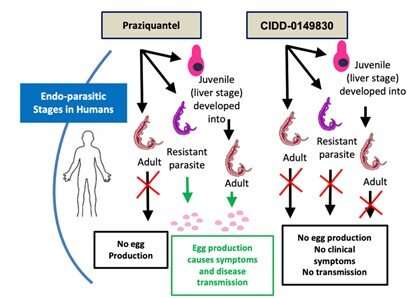This article has been reviewed according to Science X's editorial process and policies. Editors have highlighted the following attributes while ensuring the content's credibility:
fact-checked
trusted source
proofread
New compound offers hope for deadly tropical disease

A newly developed compound is showing promise in animal studies as a more effective treatment for human schistosomiasis, an understudied tropical disease caused by parasitic worms. The spread of schistosomiasis, a disease responsible for nearly 12,000 deaths globally each year, has been documented in 78 nations.
Although schistosomiasis transmission tends to occur in tropical and subtropical areas, climate change could shift it into new areas such as southern Europe. There is currently no vaccine available for the disease, which comes with severe clinical symptoms. The drug praziquantel is used for treatment. However, resistant mutations are reducing praziquantel's efficacy, and the drug doesn't kill the larval-stage parasites.
Sevan N. Alwan, an assistant professor at The University of Texas Health Science Center at San Antonio, led the research team.
"The infection can become reactivated when the larva develop into adult parasites, which comes with more severe symptoms and higher transmission rates," said Alwan, an assistant professor at The University of Texas Health Science Center at San Antonio. "The compound we developed overcomes the limitations of praziquantel by being effective against the larval stage and resistant strains."
Alwan presents the research at Discover BMB, the annual meeting of the American Society for Biochemistry and Molecular Biology, held March 23–26 in San Antonio.
"In recent reports, the cure rates for praziquantel were 60% in Sub-Saharan Africa, where the disease is highly endemic," said Alwan. "The drug limitations strongly warrant the need for new therapeutics with a distinctly different mechanism of action to reach a better cure rate."
The new compound was developed as part of the research team's effort to design, synthesize and test reengineered derivatives of oxamniquine, which was previously used to treat patients with parasite but is no longer used due to drug resistance and limited effectiveness.
The researchers developed and tested 350 compounds. Five of these killed human Schistosoma species as well as a praziquantel-resistant strain in animal models.
One of these compounds, called CIDD-0149830, also killed larval parasites in experiments with cultured cells and a mouse model of the disease. In experimental groups of five female mice each, the number of larval worms was reduced by 71.7% with CIDD-0149830, while praziquantel reduced them by only 21.1%. The study also showed that CIDD-0149830 reduced the number of eggs more effectively.
"In addition to being effective against the larval stage and resistant strains, CIDD-0149830 also overcomes the limitation of oxamniquine by being effective against two major species of the parasite in animal models and can effectively treat mixed infection by these two species," Alwan said.
Although the new results are promising, the researchers caution that they must still determine dosing for humans and perform safety and toxicity studies to make sure the treatment is safe for human use. They also plan to conduct experiments with male and female mice to assess whether sex influences the outcome of worm burden and morbidity.
More information: Abstract: Next Generation Drugs for Schistosomiasis Therapy



















